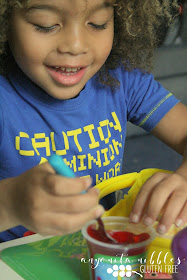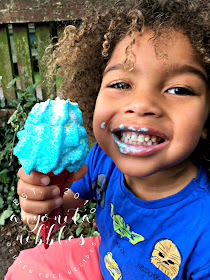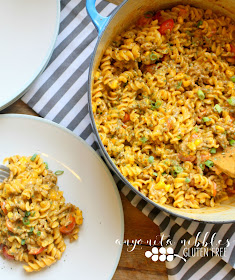We worry about our kids practically every waking moment of the day, especially when they spend so much of that day away from us at school. We worry that they'll not make friends or that they'll get bullied or that they'll feel frightened. When you're the parent of a child with a food allergy or intolerance, you worry even more: will they eat something they shouldn't? Will they have an allergic reaction? The list goes on and on. While nothing will make you stop worrying about your child, here are some useful tips you can employ to keep your gluten free child safe at school. Many of these ideas will also work for children with other allergies or intolerances, too.
There's no need to feel daunted about back-to-school if you're the parent of a food allergy kid. Read on for practical advice, tips and a sample letter you can send to your child's head teacher/principal or classroom teacher to ensure everyone is up to speed about your child's special dietary needs.
Addressing Your Child's Dietary Needs at School
Making Your Child Aware of their Food Allergy or Intolerance
If your child is old enough to go to nursery/pre-school, they are old enough to know that they have special dietary requirements to take into consideration at snack and lunch times. Keep it age appropriate and not too scary, but make a point of ensuring your child knows the basics about their dietary requirements before the first day of school.When my Coeliac son Callum was in nursery, he knew that he couldn't have gluten. He may not have known the ins and outs of Coeliac Disease but he understood that under no circumstances was he to swap lunches with any of his friends--his packed lunch was for him and him only. It's important to keep your child involved with their eating as they develop, but even more so when they have a restrictive diet.
I believe that including your child in activities like shopping, or choosing suitable foods for them from a buffet or a restaurant menu is a great way to subtly educate them about what they can and cannot have. Lay a few ground rules if your child cannot have gluten; train them to realise that most breads, crackers and cakes will probably be unsuitable for them, but most importantly, teach them to ask this question before each meal: "Is this gluten free?"
Informing the School about Your Child's Food Allergy or Intolerance
The more people who know about your child's dietary requirements, the better and more at ease you'll feel with leaving them at school. When my son started reception/kindergarten, we informed his head teacher/principal, his classroom teacher and all of the teaching assistants as well as the classroom teacher of the other reception class at his school, the school nursing staff and the dinner/cafeteria ladies. It was important to me that everyone in a position of authority or who would be handling his food knew and understand his intolerance.Although Callum was already in the habit of asking "Is this gluten free?" before eating anything, it was so important that the teachers and staff were just as versed in ensuring he only consumed things that were safe and suitable for him and his diet.
The way you make your child's teacher and staff aware of your child's needs are up to you. I had a series of conversations with the administration, his teachers and with the dinner ladies. Before the end of the first week of school, the head dinner lady even emailed me the monthly menu and all of the gluten free options so that I could ensure that everything listed was in fact gluten free and would pose no problems for Callum. Luckily, Callum's current school caters to his gluten free diet and he does not have to take school lunches, but if your child's school is not able to cater for your child's allergy or intolerance, packed lunches are your only option.
Letter to School about Your Gluten-Free Child
Here's a sample letter you could send to your child's school, reminding them of their allergy or intolerance:Dear________,
My son, _____, is looking forward to being in your class this year! As you are aware, ____ has Coeliac Disease and must take extreme care not to ingest anything containing gluten. Here are some further details that may be useful to you. Please do not hesitate to contact me with further queries or concerns.
Coeliac Disease is a life-long, incurable auto-immune condition. If ____ ingests gluten his body's immune system attacks and damages his digestive system, leading to an upset tummy, which can include vomiting and diarrhea.
Gluten is found in wheat, barley and rye. A protein called avenin is found in oats. This can upset some people with Coeliac Disease but this does not affect ______, so he is fine consuming oats. However, it is important to remember that _____ cannot ingest even the smallest amount of gluten. Cross-contamination can occur from activities such as using a knife to spread butter on gluten bread and then using the same knife on gluten free bread. These instances will make ____ poorly and must be avoided.
If _____ accidentally ingests gluten, he does not need an EpiPen or any medical attention. He will most likely have an upset tummy and ask to be excused to the toilet. He will likely have diarrhea and in rare cases, he may vomit. Ordinarily, he presents with an itchy rash on the backs of knees when he is first glutened.
During class celebrations, parties and special events, I will provide a bag of sweets and treats that are gluten free for _____ to have. I would appreciate it if you could keep this bag in the classroom and administer them when other students are having a special treat such as a child's birthday or classroom party. Please do let me know when the bag is running low and I will restock as necessary. Alternatively, if you would prefer to inform me the day before a special occasion, I can arrange for a gluten free treat to be left with ____ on the day.
Other members of school staff have been informed of _____'s dietary requirements and I am working with them to ensure that he is kept safe and his needs are addressed. _____ is also aware of his dietary requirements and will ask that anything he is given is gluten free before consuming. He is very responsible and proactive with his health and understands the ramifications of being glutened.
I am aware that some classroom items such as Play Doh or dried pasta may contain gluten. ____ is fine to play with these as he will only have a reaction should he ingest them. He knows not to try to eat Play Doh and dried pasta or anything that has not been cooked or is not edible.
If you have any queries or concerns, please do feel free to reach out to me or ______'s father at any time.
Yours Sincerely,
______________
Feel free to copy/paste my letter and print it out for your own child.
Packed Lunch vs School Dinners
Every child likes to do what his school friends are doing. When Callum was in nursery, the "cool" thing to do was to take a packed lunch because all his friends were doing it. At his current school, having a hot school dinner is the thing to do and luckily for us, his school caters for his gluten-free needs.When packing a gluten-free lunch for your child, remember to make it fun. Callum absolutely hates gluten-free bread, especially the crusts. To deal with this, I would use plastic cookie cutters to cut his sandwiches into shapes and cut the crusts off. He enjoyed opening his lunch box every day to find an exciting new shape! We had everything from fire engines to airplanes, teddy bears to cars, to circles, stars and fish. Don't forget those little extras like snacks and treats for the lunch box. Choose snacks that you already know are gluten-free and don't forget fruits, veggies and a drink!
Celebrations, Parties and Classroom Occasions
As I mentioned in my letter to Callum's teacher, I have found it easier to bring a stock of non-perishable gluten-free sweets and treats to be left in the classroom that the teacher can administer in the event of a party, celebration or other occasion. You may find that this is useful for your family, too.
Are you the parent of a child with a food allergy or intolerance? How do you address letting your child's school know about their dietary requirements? Leave me a comment and let me know your thoughts and further tips you may have to share!
Child Friendly Gluten-Free Dinner Recipes




















No Comments Yet, Leave Yours!
Post a Comment
What do you think of this recipe? Be sure to tag me in any recipes you make on social media and use #anyonitanibbles!